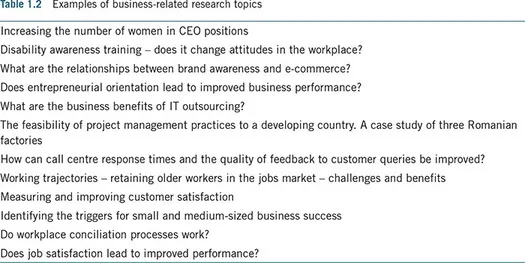Chapter outline
- Research in the business world
- The nature of theories
- An overview of the research process
- The organization of the book
- How to use this book
Keywords
- Methodology
- Theory
- Basic research
- Applied research
- Research topics
- Research process
Chapter objectives
After reading this chapter you will be able to:
- Describe why research in the business world is of increasing importance.
- Explain the nature of theories.
- Outline the stages in the research process.
- Use this book effectively by making use of its features such as Activities and Top Tips.
- Use this book to build up your Employability Skills.
This book is designed to introduce you to some of the essential methodologies, approaches and tools for business research. In doing so, we will explore some of the philosophies and theoretical perspectives behind the many different ways of conducting research, as well as providing practical examples and guidance as to how research should be planned and implemented. Later in this chapter we will look at the structure of the book, but first we need to examine the nature of the research process and why research is being seen as increasingly important in a growing number of businesses, organizations, communities and contexts.
Watch: Research in business
The term ‘globalization’ is often used to describe a world that is becoming increasingly integrated and interdependent and where large, multinational corporations dominate. Within this globalized world, change in business and working environments has become rapid and pervasive. Organizations have adapted to this uncertainty in a number of ways. One approach has been to understand (often through research) and develop relationships with both markets and supply chains. Most forward-looking organizations have also recognized the need for a multi-skilled and occupationally agile workforce. It has also required that organizations understand what motivates their workforce and how people embrace change. All this has had an enormous impact on the way organizations operate and interact with the business world, and how they communicate and work. Small and medium-sized enterprises (SMEs) have also had to modernize their organizational practices and to understand their working environment, and, above all, their markets. Furthermore, governments and other sponsors of research have shown a desire to see ‘value for money’ when funding research projects, based, at least in part, on projects providing evidence of sound and robust research methodologies.
Faced with a more competitive, dynamic and uncertain world, knowledge of research methods is important because it helps people in organizations to understand, predict and control their internal and external environments (Sekaran and Bougie, 2013). It also means that those involved in commissioning or sponsoring organizational research are better placed to understand and manage the work of researchers and to objectively evaluate and interpret the outcomes of research. Hence, it becomes possible to calculate the potential risks and benefits in implementing research projects.
Research is also of value in itself. Completing a research project (such as a dissertation or thesis) can provide you with lifelong skills, including Employability Skills (writing research proposals, planning the research, designing data gathering instruments, collecting data and abiding by a code of research ethics, to name but a few). Employability Skills include sets of achievements, knowledge and personal attributes that make individuals more likely to gain employment and to be successful in their chosen occupations (Knight and Yorke, 2002). As we discuss below, Employability Skills are, in part, built up through developing research skills and are a feature of this book. But what do we mean by the term ‘research’? Let’s look at this in more detail.
Research in the business world
Business research has been defined as: ‘the systematic and objective process of collecting, recording, analysing and interpreting data for aid in solving managerial problems’ (Wilson, 2014: 3). Hence, research is often about how (process) to solve real problems (content) (Gill and Johnson, 2012). This may have a very practical focus (applied research), with an emphasis on achieving measurable outputs that are specific to a particular business or organization. The results of such research may be of significance to a specific context, but difficult to generalize elsewhere. On the other hand, research may also be concerned with clarifying, validating or building a theory (basic research). Its importance to society or to organizations may be determined by the extent to which this theory is translatable into a specific context. However, most organizations will only see research as valid if it is seen to lead to practical outcomes (Easterby-Smith et al., 2002). Then there are forms of research comprising collaboration between the researcher and professional practitioners (often an element of action research). Table 1.1 provides a summary illustrating a continuum between basic and applied research.
Watch: Research in business
Read: Business research introduction
Watch: Basic vs applied research
Table 1.1 Source: Adapted from Saunders, Lewis and Thornhill, Research Methods for Business Students, 6th edn.
Business research brings with it many challenges, with the last 20 years seeing significant upheavals in the business and economic environment. Apart from economic competition (and downturns), businesses have had to cope with changes in government social and economic policy, the explosive growth of new technology (including e-commerce) and major innovations in global communication. One result has been that managers have to develop new skills and knowledge and make decisions that impact not just on those inside the businesses, but with a broad range of partners, external stakeholders and networks. To survive and thrive in such environments, businesses need to have access to high-quality, research-driven information on which to base their decisions. In conducting this research, managers and student researchers can draw upon broad fields of enquiry such as business theory, economics, sociology, psychology, anthropology, philosophy and communication. This often means having to adopt an inter-disciplinary approach, incorporating ideas and approaches from a diverse range of subject backgrounds. Secondly, research in the business world means the researcher has to gain access to social settings or business environments where key research sponsors, gatekeepers or stakeholders may have their own agendas that are not necessarily the same as those of the researcher. Thirdly, research may be influenced by the fact that research sponsors such as governments or businesses are working in a world of competition, market influences and financial constraints. Research projects may have to be modified or cancelled. Research sponsors may criticize what they read in research reports, especially when these reveal inadequacies or inefficiencies in the businesses they manage. The business world, of course, contains a myriad of subjects that lend themselves to research. Table 1.2 provides just a general ‘feel’ for the kinds of areas that this book will explore. You will, of course, be thinking about or developing a research topic of your own.
But how do we go about addressing these kinds of research areas? One way to solve any problem in the business world is to do so systematically. While Figure 1.1 presents a very simplified versi...

















